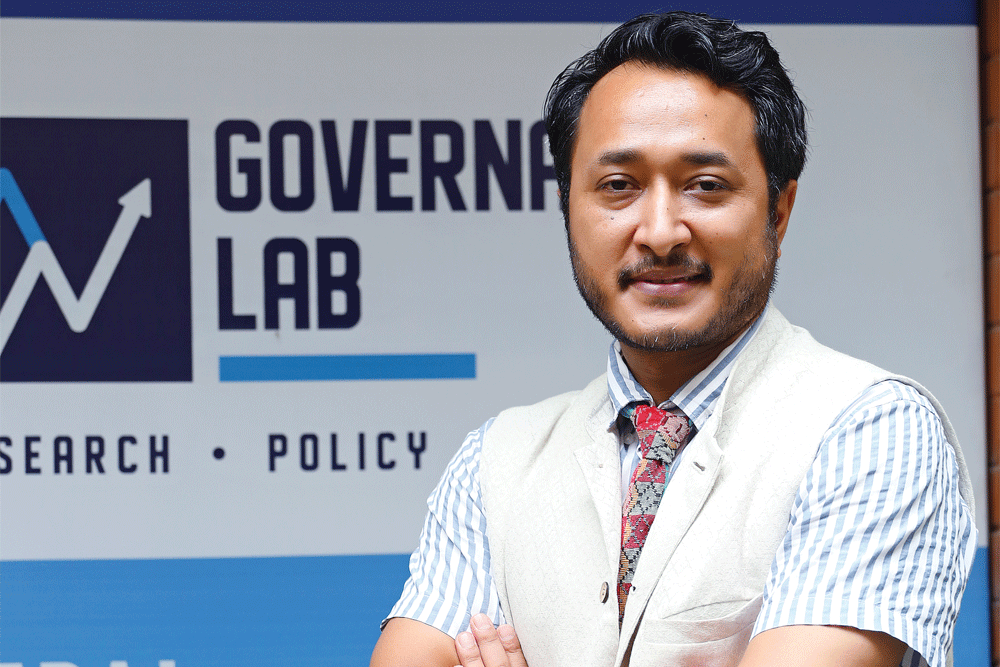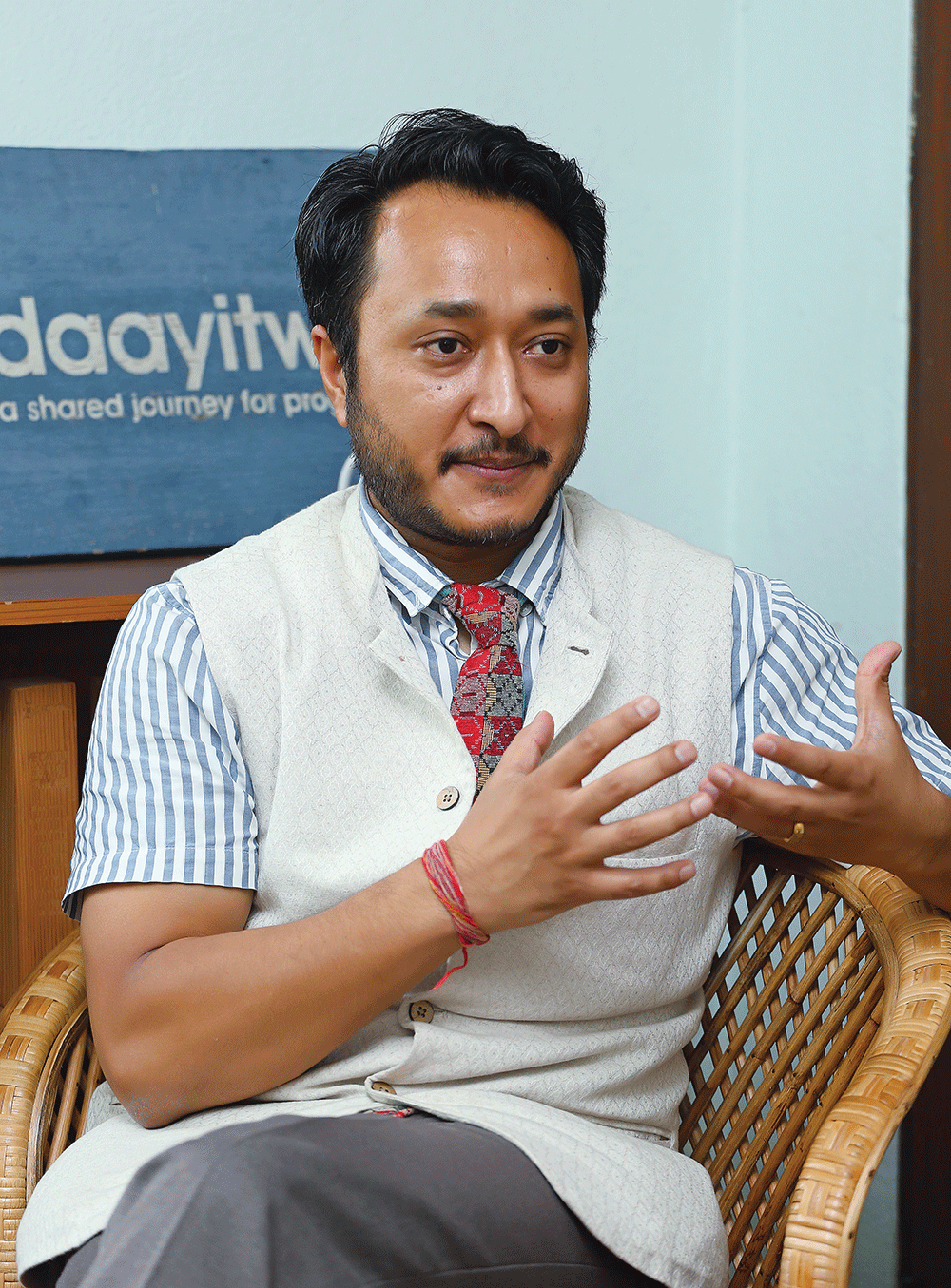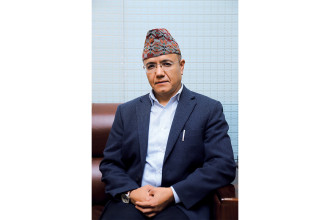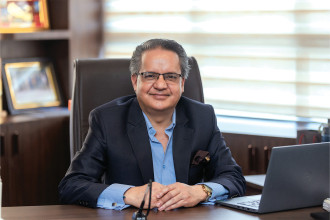
Pukar Malla
Founder and Coordinator
Daayitwa
The reason behind establishing Daayitwa, says Pukar Malla, was to create a brighter future for all the citizens of the country. Passionate about bringing change among the youth, Malla realised the need for a proper platform where people could come together and share ideas and experiences, hence Daayitwa, he says.
With over a decade leading Daayitwa, Malla says that the focus is not about just organising programmes and having people come to speak, “There is a greater purpose and that is to bring about meaningful change in the lives of people we touch.”
“Even though we are majorly known as Daayitwa, we are a part of a bigger cause called Daawitya Abhiyan which includes four organisations with three based in Nepal and one in the United States,” he shares. Daawitya, Fellowship Programme and Nepal Leadership Academy are the ones operating in Nepal.
In this edition of Business 360, Malla shares his thoughts on leadership.

Your definition of a leader
A person who accepts the responsibility to enable others and achieve a shared goal even during uncertain times by utilising available resources is a good leader. Leaders do not begin with answers; they begin with questions and work with their teams to find the answers. Oftentimes we only consider a certain type of person as a leader, specifically who are tall, charismatic and can talk well and forget to look around. One of the finest examples of a leader is our mother who leads and motivates the family to stay together in uncertain times to share the purpose of happiness. Similarly, many times we are confused between leadership and authority. People with authority do not necessarily have leadership qualities but it’s also important that in order to lead, authority is important. Leadership can depend both on nature and nurture. Some people are born with such qualities but it is also true that these qualities can easily be taught which is what Nepal Research Academy is trying to do but these qualities are mostly acquired rather than inborn.Who comes to your mind as an ideal leader?
For me, leadership is work and not just a single person. For example, Numa Bhandari, also known as ‘Kagati didi’ who started by selling lemons has reached such heights of success that no one had ever imagined that by farming lemons in steep hills she would be such a success. And if she is not a leader then who is? Similarly, Ganesh Rai is another commendable example who introduced ‘Mapase’ checking in Nepal to reduce the number of accidents caused by drunk driving. So, leadership is work, it is a verb and not just the person.How important is it to have a good team to work with?
Work is the core of leadership and working in a good team, maintaining a proper relationship with everyone in your circle is equally crucial because if not, it can become a lonely journey.When should a leader hand over the leadership position?
I believe there are three factors that determine this decision. Firstly, it is when there is someone better suited for the work and who can perform better than you because leadership isn’t about you, it’s about the work that needs to be done. The next would be when the person stops innovating and is out of ideas then they should hand over the responsibility to someone who is full of ideas. A person should always ask themselves what they have done in the past few years or in the past few months and if there is no answer available then it’s the perfect time to hand over the reins. Lastly, we have to look for what the world wants from us. Maybe the world wants you to become an advisor to the new generation, to build the foundation for the international recognition of the country like many former leaders of Nepal have been doing.
Do you think leaders get the realisation that it’s time to quit?
Strength, affirmations and intimacy are the three things that a person should be hungry for when working and leaders must be able to manage all of these in order to lead, and this can only be done when a leader can analyse themselves and also the problems thrown across their way. So, a person or a leader must be able to see through themselves in order to realise what the work demands from them.How did the pandemic affect your work and is it still a problem?
It was definitely a difficult time for us to perform due to lack of funds but the most important thing that happened was that we were in our house evaluating ourselves and our actions to learn about our strengths and weaknesses. We started to let go of programmes that were irrelevant at that point of time and focused on relevant subjects. We also realised the importance of closeness to the community. They empower us by providing innovative ideas and energy and we empower them by giving support and solutions. So, it is a cycle of give and take. The Covid 19 did have an impact but we came out of it stronger.How have your leadership qualities contributed to the organisation?
I believe that people working with me may have a better answer to this question but if I have to answer, I would say that I have stayed extremely true to myself from the very first day of the journey of 14 years. There isn’t a moment when I haven’t thought about how to better the organisation and the country. Also, staying true to your values and being persistent are very necessary to exercise leadership roles successfully. One has to be true to the values and make decisions by keeping the organisation at the forefront.What would you consider your most significant accomplishment as a leader?
One of my significant achievements I feel is the fact that I have been able to make people realise that Nepal is full of opportunities. I have been able to motivate people to create something new, make a change, and have an impact on the community. I also believe we have been able to make youths realise that they can bring innovation, identity and impact together to achieve their goals.How can leaders prepare for the unknown?
Leadership is full of uncertainties. So, one should have a vibrant love for learning which enables us to be better prepared for the unknown and there should be a passion to make an impact. The keys for it are patience and persistence. READ ALSO:- ‘A leader is a person born with the potential to become one’
- ‘I believe that to have leadership qualities, one has to have attributes like empathy and sensitivity
- ‘I discovered that an individual is not a problem but the process of working is’
- ‘Core responsibility of a leader is to guide and nurture the team’
Published Date: September 30, 2022, 12:00 am
Post Comment
E-Magazine
RELATED Leadership





-(1)-1752214965.jpg)